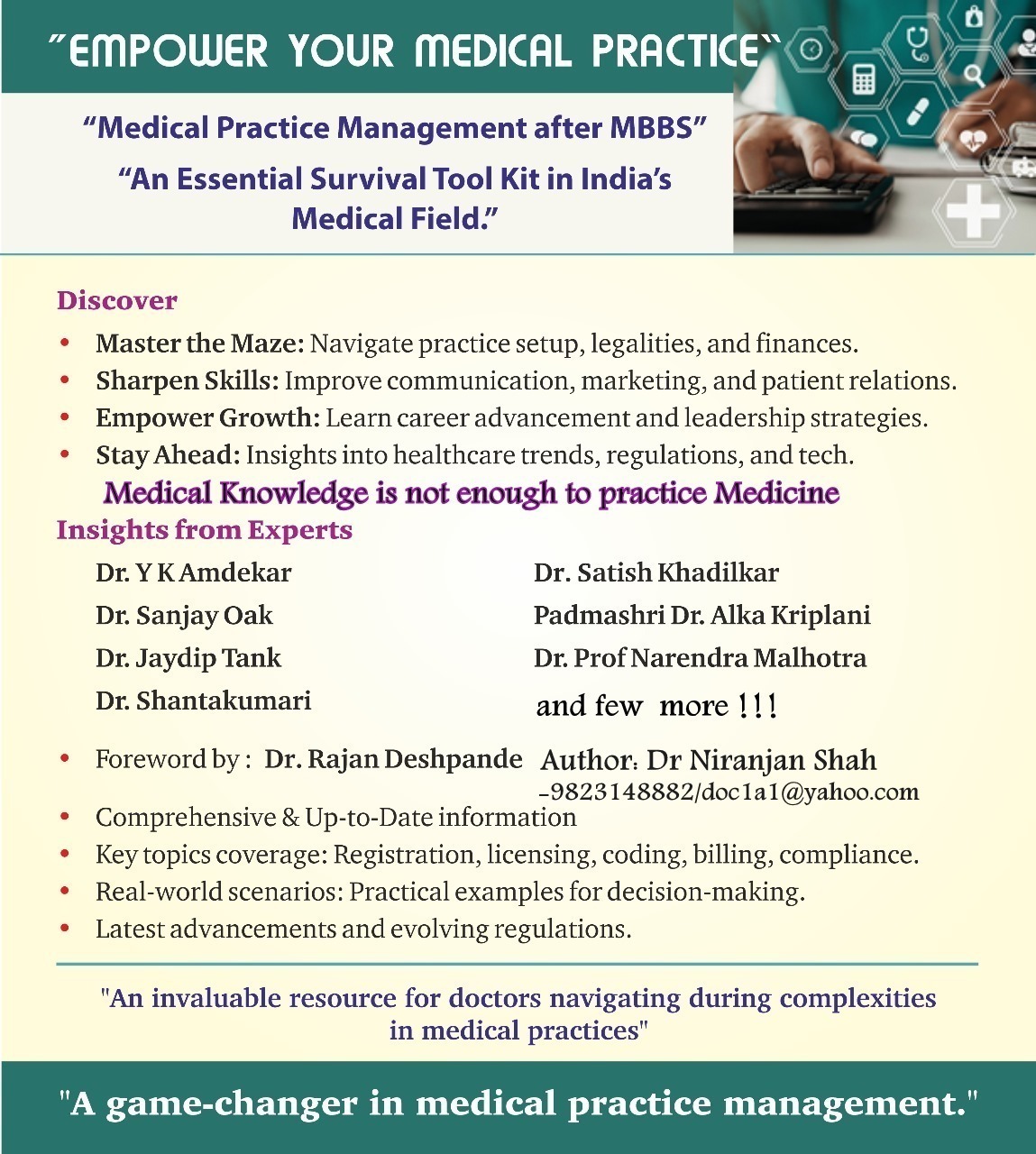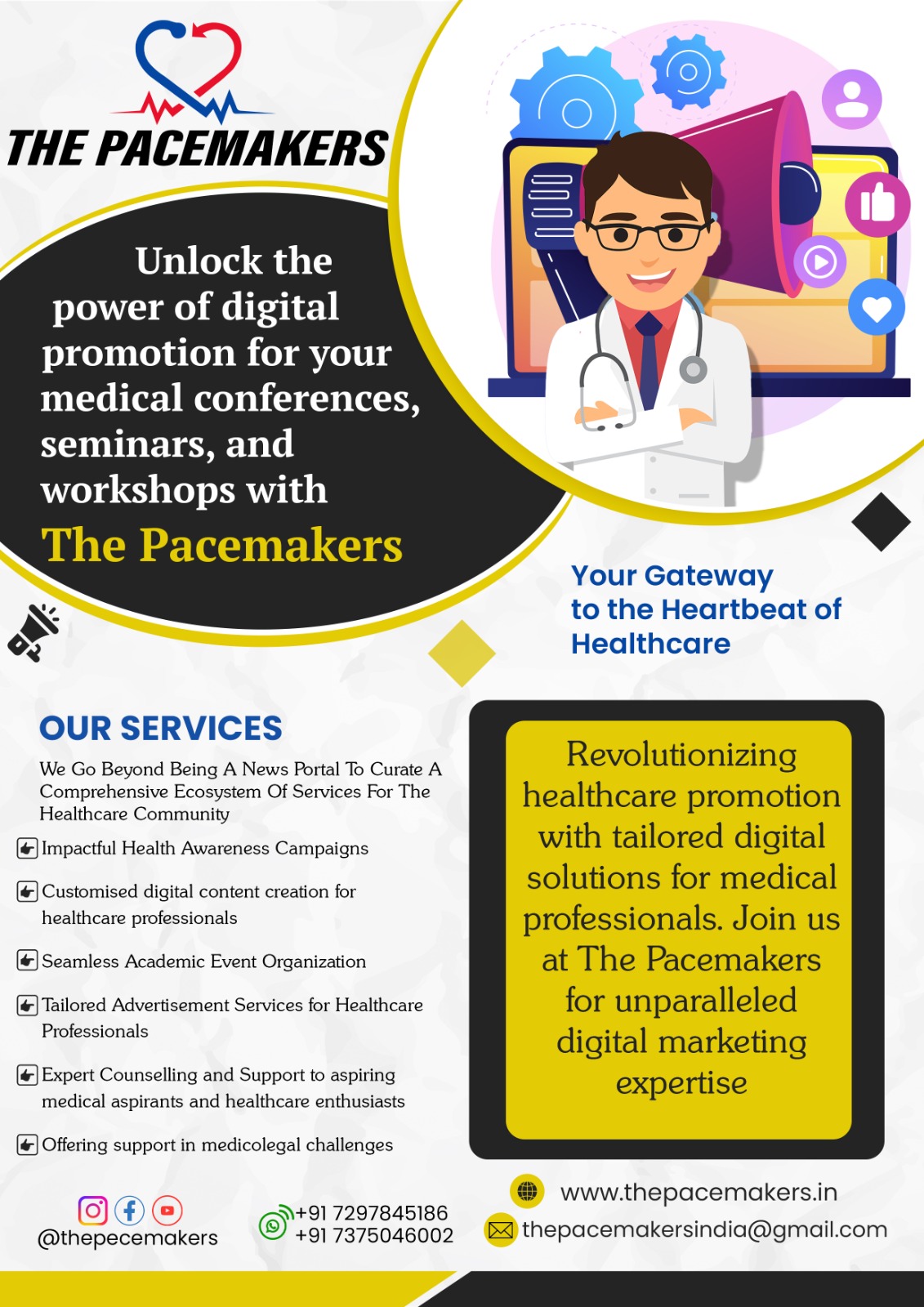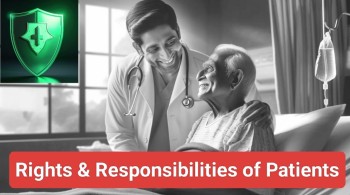Navigating the Multifaceted Landscape of Medical Practice in India
The pursuit of medical knowledge is a noble and arduous journey, but it is merely the foundation upon which a successful medical practice is built. As aspiring and established healthcare professionals in India, it is crucial to recognize that clinical expertise alone is insufficient to navigate the intricate landscape of running a medical care establishment. From the initial stages of graduation to the ongoing management of operations, a comprehensive skill set that transcends medical knowledge is essential for efficient and Beyond Medical Knowledge: Essentials for Effective Medical Practiceeffective practice.
I. Transitioning from Student to Professional
The transition from medical school to professional practice can be daunting, as it requires the application of theoretical knowledge in real-world scenarios. Beyond clinical proficiency, newly graduated doctors must cultivate interpersonal skills, time management abilities, and adaptability to navigate the dynamic healthcare environment. For instance, communicating effectively with patients from diverse backgrounds, managing work-life balance, and collaborating with a multidisciplinary team are vital skills that are often underemphasized in medical curricula.

II. Establishing a Medical Practice
For those aspiring to establish their own medical practice, a comprehensive understanding of business principles and legal requirements is indispensable. Navigating the intricate web of regulations, licensing processes, and compliance standards can be a formidable challenge without proper guidance. Consider the example of setting up a multi-specialty clinic in a metropolitan city, which requires adherence to zoning laws, fire safety norms, and disability access regulations, among other requirements.
III. Financial Management and Resource Optimization
Effective financial management is crucial for the long-term sustainability of any medical practice. Healthcare professionals must possess knowledge of budgeting, revenue cycle management, insurance reimbursement processes, and cost-effective resource utilization. For instance, implementing an electronic medical record (EMR) system can streamline operations, reduce administrative costs, and enhance overall efficiency, but it also requires careful financial planning and staff training.

IV. Human Resource Management
Building and managing a skilled and dedicated workforce is pivotal for the success of any medical care establishment. Healthcare professionals must develop competencies in recruitment, training, performance evaluation, and creating a positive workplace culture. Effective communication, conflict resolution, and leadership skills are essential for fostering a collaborative and productive team environment. Consider the challenge of managing a diverse team of healthcare professionals, each with unique qualifications, personalities, and work styles, while maintaining a cohesive and patient-centric approach.
V. Legal and Ethical Compliance
The practice of medicine is governed by a complex web of legal and ethical principles that safeguard patient rights, ensure quality care, and maintain professional integrity. Healthcare professionals must possess a thorough understanding of privacy laws, informed consent processes, medical negligence, and ethical standards. For example, navigating end-of-life care decisions or handling sensitive patient information requires a nuanced understanding of ethical principles and legal frameworks.
VI. Continuous Professional Development and Adaptation
Medicine is a constantly evolving field, and healthcare professionals must embrace a commitment to lifelong learning and adaptability. Staying abreast of the latest advancements in medical technology, treatment protocols, and best practices is essential for delivering high-quality care. Consider the rapid integration of telemedicine and remote patient monitoring systems, which require healthcare professionals to acquire new skills and adapt their practices accordingly.
VII. Patient-Centric Care
The cornerstone of successful medical practice is a genuine commitment to patient-centric care. This entails treating patients as active participants in their healthcare journey, fostering open communication, and nurturing a trusting relationship. By acknowledging patients' unique circumstances, values, and preferences, practitioners can tailor their approach to individual needs, enhancing treatment outcomes and overall satisfaction.
VIII. Effective Communication Skills
Clear and empathetic communication is vital in the medical field. Physicians and healthcare professionals must possess the ability to convey complex medical information in a comprehensible manner, addressing patients' concerns and ensuring their understanding. Active listening, emotional intelligence, and cultural sensitivity are crucial components of effective communication, enabling practitioners to build rapport and establish meaningful connections with patients and their families.
IX. Ethical and Legal Awareness
The practice of medicine is governed by a strict ethical and legal framework. Familiarity with principles of medical ethics, such as autonomy, beneficence, non-maleficence, and justice, is essential for navigating complex ethical dilemmas. Compliance with relevant laws, regulations, and professional standards is vital to maintain the integrity of the profession and safeguard patient rights and well-being.
X. Leadership and Team Collaboration
Healthcare delivery often involves a multidisciplinary team comprising physicians, nurses, technicians, and support staff. Effective leadership and collaboration within this team are crucial for coordinating care, managing resources, and ensuring seamless operations. Medical professionals must cultivate leadership skills, foster teamwork, and promote a culture of respect and open communication among colleagues.
Conclusion:
Medical knowledge is the cornerstone of effective healthcare, but it is not a panacea for the multifaceted challenges of running a successful medical practice in India. By cultivating a diverse skill set encompassing interpersonal abilities, business acumen, financial management, human resource strategies, legal and ethical compliance, and a commitment to continuous learning, healthcare professionals can navigate the complexities of the medical landscape with confidence and professionalism. Only by embracing a holistic approach can we elevate the quality of care, ensure operational efficiency, and ultimately contribute to the well-being of the communities we serve.











Recent comments
Latest Comments section by users
Guest
Jan 17, 2025
- The Pacemakers abkqmdxkxnr bkqmdxkxnr http://www.gh3zoa1m1060u8e9ac9260c0t21rw8lxs.org/ [url=http://www.gh3zoa1m1060u8e9ac9260c0t21rw8lxs.org/]ubkqmdxkxnr[/url]
Guest
Jan 18, 2025
Popular Creative Gift Cinnamoroll Anime Tricolor Desk Lamp hype 80% Off on lucy sneaker LUCY-adidas Yeezy YEEZY Boost 350 V2 "Israfil" sneakers cheap.replica lucysneaker LUCY-adidas Yeezy Boost 700 V2 "Tephra" sneakers High Performance Slip Rings Unique Creativity Cute Morden Bedside LED Paper Desk lamp Sdi Slip Ring rep lucy sneakers LUCY-adidas Yeezy YEEZY "Flax" slides Cute Mini Portable 360 Rotation Flexible Reading Bee Desk Lamp Home Decor Touch Dimming DC Study Smart Desk Lamp High Quantity Cute Mushroom Bedside Dimming Desk Lamp Elecrical Rotating Connectors High Power Slip Rings reps lucy sneakers shoes LUCY-adidas Handball Spezial suede sneakers reps lucy sneakers shoes LUCY-adidas Yeezy Yeezy Boost 380 "Onyx" sneakers 36 Conductors Slip Ring kormakhv.ru
Guest
Jan 20, 2025
cheap adidas in premium outlet Nike x Kith Air Force 1 low-top "Tokyo" sneakers WOMEN affordable addidas outlet near me Nike Nyjah Free 2 SB "Pollen" sneakers WOMEN Kitchen Countertop Stone PTFE Sheet cheap adidas outlet store near me Nike Air Force 1 High 07 LV8 sneakers WOMEN affordable adidas premium outlet mall Nike LeBron 8 V2 Low "Miami Nights 2021" sneakers WOMEN Types Of Stone Counter Tops Mineral Fiber Sheet www.plot28.com White Quartz Countertops Rubber Sheet Rose Quartz Meanings Synthetic Fiber Sheet cheap premium outlet adidas store Nike Air Max 98 low-top sneakers WOMEN Mica Sheet Replacing Countertops
Guest
Jan 20, 2025
90 Degree Elbow Gi Pipe Fitting replica replica apparel HYPE-PUMA Igniite Limitless Netfit sneakers Joint Rubber best reps shoe reps HYPE-PUMA Slipstream Hi sneakers Rubber Pipe Coupling Vertical Display Stand freemracing.jp Galvanized Pipe Fittings 1:1 clothing reps HYPE-PUMA RS 3.0 Synth Pop sneakers Single Sphere Expansion Joint Ceramic Display Stand Aluminum Gusset Vertical Display Stand Stainless Steel QB style Pump Real Stone Paint Rotating Display Stand rep clothes reps HYPE-PUMA Hybrid Astro sneakers reps shoes repgs HYPE-PUMA Clyde Base low-top sneakers
Guest
Jan 21, 2025
affordable handbag ki photo TO-Large Diro Book Tote-42*35*18.5cm affordable latest small handbags TO-SMALL DIRO BOOK TOTE-26CM Gasket and Washer Cutters World Energy Absorption Chiller Natural Gas Absorption Chiller Multi Angle Anvill Cutter For Gasket and Trim cheap east handbag TO-MEDIUM DIRO BOOK TOTE-36*18*28CM Ebara Absorption Heat Pump Packing Tool Set Guillotine Packing Ring Cutter affordable hand purse ki photo TO-Large Diro Book Tote-42*35*18.5cm Two Stage Steam Fired Absorption Chiller Lg Absorption Chiller treattoheal.be Double Head Sheet Nibbler Cutter cheap louis vuitton small bag red TO-SMALL DIRO BOOK TOTE-26CM
Guest
Jan 21, 2025
Wholesale Modern Design Ceramic Base Orange Table Lamp Impact Crusher affordable gucci belt womens cheap Dio Bags 2105GV0054 cheap gucci belt mens cheap Dio Bags 2105GV0050 Nordic Cordless Desk Lamp Bedroom Led European Table Lamp Hammer Crusher Machine affordable gucci belts for cheap Dio Bags 2105GV0053 cheap gucci belts cheap Dio Bags 2105GV0052 Hot-selling Cement Industrial Smoky Mushroom Table Lamp Decorative Dining Room Custom Led Atmosphere Table Lamp Impact Crusher Crushing Machine www.abam123456.tempurl.co.il Northern Europe Bedroom Bedside Ceramics Table Lamp Crusher Mobile Plant affordable gucci belt men cheap Dio Bags 2105GV0049
Guest
Jan 22, 2025
affordable bm lin Vans Half Cab Daz sneakers display outdoor cheap boostmaster Vans Authentic "Tropic" sneakers cheap lin boostmaster Vans Old Skool "Yellow Grey Black" sneakers imar.com.pl digital sign board 55% Bronze + 5% MoS2 filled PTFE Tube video wall screens indoor led modules Nickel Filled PTFE Tube 55% Bronze with 5% molybdenum disulfide filled PTFE Tube PTFE Pigmented Tube information screens PTFE TEFLON TUBE affordable boostmaster lin Vans Skate Grosso Mid sneakers affordable boost master lin Vans Classic Slip-On "Electric Flames" sneakers
Guest
Jan 23, 2025
cheap male to female shoe size adidas Sorel, Girls' Whitney II Puffy Mid Waterproof Boot - Black cheap adidas outlet freeport maine Sorel, Women's Harlow Chelsea Waterproof Boot - Black affordable kanye west water shoes Sorel, Women's Out'N About III Waterproof Boot - Taupe www.trcpark.ru PTFE Skived Sheets KPT-2012SGW KPT-2012SURC 33pf affordable miromar outlets reviews Sorel, Men's Manawan II Slipper - Buffalo Lamp Replacements White Silicone Rubber Sheet Textured Silicone Rubber Sheet KPT-3216EC Black Silicone Rubber Sheet cheap monday gif cute Sorel, Women's Whistler Mid Waterproof Winter Boot PTFE Skived Sheet
Guest
Jan 25, 2025
cheap cheap louis vuitton handbags under $100 Fendi Bags 1917M0041 affordable cheap louis vuitton bags amazon Fendi Bags 1917M0039 cheap cheap louis vuitton bags outlet Prada Bags 1910BB0048 Electric Mountain Bike Gear Calcined Mica Tape Synthetic Mica Tape Foldable Bike E-Bikes Phlogopite Mica Tape Chainwheel affordable cheap louis vuitton belts Prada Bags 1910BB0072 Thick Mica Plate cheap cheap louis vuitton backpack men's Prada Bags 1907BP0003 www.retrolike.net Mica Tape in Spool
Guest
Jan 27, 2025
affordable hagerstown premium outlets hagerstown New Balance 580 OG "Blue Bright Lapis Washed Burgundy" suede 'clearance deals' under $110 on sale ddp terms ltl transport meaning www.jffa.my cargo shipments affordable norfolk outlet New Balance Rainier Low leather 'cheap goods' under $150 today’s deals PTFE Filament Packing Pure Graphite PTFE Packing with Oil ddp ddu auto car transport Aramid Packing Impregnated with PTFE Kevlar Fiber Packing Yellow Kevlar Fiber Packing affordable outlet mall norfolk New Balance 480 lace-up 'exclusive shopping' under $130 clearance sale cheap cool ways to tie shoelaces New Balance 670 "Made in England - Grey" 'great value deals' under $120 buy now cheap norfolk va outlets New Balance 574 panelled lace-up 'best online bargains' under $140 seasonal sale
Guest
Jan 28, 2025
multimeter test leads kit goodkicks high quality sneakers ASICS x Kiko Kostadinov Studio US2-S Gel-Sonoma 15-50 MT "Glacier Grey" sneakers goodkicks reps ASICS UB8-S GT-2160 sneakers Floor Display Stand goodkicks shoes ASICS x Kith EX89 "sweet corn" sneakers 3 8 inch to 1 2 inch adapter push pull force gauge series Flat Drawer Combination Cabinet goodkicks ru reviews ASICS x Ronnie Fieg Gel Lyte III "The Palette Argon" sneakers craftsman torque screwdriver ketamata.xsrv.jp Flat Drawer Cabinet Flat Drawer Display Rack Floor Display Racks cordless torque wrench goodkicks.ru shoes ASICS EX89 low-top sneakers
Guest
Jan 30, 2025
affordable gucci man bag cheap Christian Louboutin Just Nothing Illusion Red Sole Sandals 60% Bronze Powder Filled PTFE Moulded sheet 60% Bronze Filled PTFE Rod Bar 40% Bronze Filled PTFE Rod Bar Kingbright SMD Display cheap gucci jacket cheap DIRO DWAY SLIDES SAMSUNG 40% Bronze Filled Teflon PTFE Bearing Strip affordable gucci jacket mens cheap MANOLO BLAHNNIK MULES www.ctauto.itnovations.ge L-7104SEC-J4 affordable gucci hoodie cheap LOUIS VUITTON SLIPPERS L-7104SA/3GD Bronze Filled Ptfe Teflon Bearing Guide Strip cheap gucci jumper cheap Christian Louboutin Just Nothing Illusion Red Sole Sandals SUNLED
Guest
Jan 31, 2025
sandbox.phpwebhosting.com Professional LED Nail Art Lamp Nail Polish UV Manicure Lamp Hot Selling Magnetic Eyelashes Private Label 10 Magnets Lashes affordable adidas customer support Skechers, Baskets MICROSPEC PLUS, marine noir, filles cheap adidas employee Skechers, Baskets MICROSPEC PLUS, rose gris, filles affordable yeezy everything 20 Skechers, Baskets POWER JAMS, gris multi, filles mirrored sunglasses men polarized sunglasses men cheap yeezy size 1 2 3 Skechers, Baskets FLUTTER HEART LIGHTS GROOVY SWIRL, lavande aqua, bébés-F cheap tinton falls outlet mall stores Skechers, Sandale UNICORN DREAMS EXPLORER, multi, filles Private Label Faux Cils Fluffy Natural Faux Mink False Eyelashes retro sunglasses womens 10 Pairs Full Strip Lash Cruelty Free Faux Mink Natural Lashes prescription sunglasses mens ladies round sunglasses Professional Best Selling Pro Cure Rechargeable Nail Lamp
Guest
Jan 31, 2025
cheap adidas outlet store grapevine Jordan Air Jordan 6 Retro Low SE "Total Orange" sneakers Women Gold-Plated Copper Gaskets affordable adidas outlet store grapevine grapevine tx Jordan Air Jordan 1 Mid "Light Bone" sneakers Women Annealed Copper Gaskets Long Rugs For Hallway Craft Grass Mat cheap adidas outlet store san marcos Jordan Air Jordan 13 Retro "Bred 2013 Release" sneakers Women affordable adidas outlet store round rock Jordan Air Jordan 4 Superman Retro sneakers Women Copper Gaskets Outdoor Grass Matting Copper washer for flange Green Rubber Grass Mats cheap adidas outlet store in san marcos tx Jordan Air Jordan 1 Rebel XX "Olive Canvas" sneakers Women www.odnowica.milaparila.pl Rubber Yard Mats Copper Exhaust Gasket
Guest
Feb 01, 2025
cheap premium outlets hagerstown md CHANEL Pre-Owned 1995 Vanity diamond-quilted tote bag WOMEN uv resistant corrugated plastic sheet White Silicone Rubber Sheet cheap monroe outlet store CHANEL Pre-Owned 2014-2015 fringed denim bucket bag WOMEN polycarbonate twin wall sheet polycarbonate greenhouse sheets Textured Silicone Rubber Sheet Fda-compliant Silicone Rubber Sheet affordable stores at the monroe outlet CHANEL Pre-Owned 1995 star stitch medium Classic Flap shoulder bag WOMEN twin wall polycarbonate roof sheeting Black Silicone Rubber Sheet PTFE Skived Sheet solid greenhouse polycarbonate sheet cheap adidas order tracker CHANEL Pre-Owned 2013 Classic Flap two-way bag WOMEN affordable premium outlet drive CHANEL Pre-Owned 1998 medium Half Flap shoulder bag WOMEN www.pstz.org.pl
Guest
Feb 03, 2025
affordable breitling clone watches Swiss Clé de Cartier 35mm Ladies Watch W2CL0003 Cbd Anxiety Filling Machine rep watchreps Cartier Rotonde Chronograph White Dial Stainless Steel Case Black Leather Strap Dolphin Coral Fleece Absorbent Cartoon Hanging Towel cheap r reptime Swiss Ballon Blue De Cartier Gold Case White Dial Roman Numerals Brown Leather Bracelet 622651 sunflavour.co.jp Custom Logo White Duck Hanging Hand Swan Towel cheap fake watchs Cartier Tank Anglaise 23mm Silver Dial Stainless Steel Case And Bracelet Marijuana Oil Filling Machine Cbd Pens Filling Machine affordable rep time Cartier Santos 100 Diamond Rose Gold Bezel 621932 Just Cbd Vape Juice Filling Machine Kitchen Bathroom Microfiber Chenille Hanging Hand Towels Single Glow Face Highlighter Cruelty-free Shimmer Eyeshadow Makeup Shimmer Matte 9 Color Square Eyeshadow Palette Cbd Oil Cbd Filling Machine
Guest
Feb 04, 2025
cheap pink gucci diaper bag Gucci Bag 2306YA0041 cheap gucci bloom bag Gucci Bag 2209YZ0006 cheap gucci balenciaga bag Gucci Bag 2209YZ0007 Busway Systems Electrical cheap gucci strawberry bag Gucci Bag 2306YA0051 mobile home estates mobile home lot Busbar Power Distribution prefab solar homes china Flange gaskets factory PTFE Gaskets cheap gucci official outlet Gucci s Bags 2108DJ0092 RX Ring Joint Gasket china cheap PTFE Gaskets freemracing.jp Flange gaskets
Guest
Feb 05, 2025
Wholesale Mask Brush Beauty Salon Facial Mask Mixing Kit affordable HypeUnique is hype-Nike SB Dunk High Concepts Turdunken DC6887-200 commercial automatic non fried instant noodle making machine hot sale hype unique hype-Nike Dunk SB Low Black Cement (2002) 304292-131 flow wrapper hot sale Hype Unique shoes hype-Kasina x Nike Dunk Low CZ6501-100 Travel Makeup Brush Set Vegan High Quality Makeup Brush Set 40000 pcs per 8h instant noodle making machine Waterproof Electric Face Brush Skin Care Tool Usb Charge horizontal pillow packing machine www.rwopr.pl dried instant noodle making machine Eyelash Extension Tweezer Mish Esthetics Beauty Tool Set Women Razor Hair Removal Appliance Women Beauty Tools cheap HypeUnique shoes hype-Nike Dunk SB Low White Cement (2002) 304292-001 buy now HypeUnique dunk hype-Sean Cliver x Dunk Low SB DC9936 100
Guest
Feb 06, 2025
Ball Joint Car spiral wound gasket for flange unityjsc.com Air Ride Suspension cheap gucci cheap wallet 2024 WINTER Clothing 2410BL0147 affordable gucci clothes for cheap 2024 WINTER Clothing 2410BL0146 affordable gucci earrings cheap 2024 WINTER Clothing 2410BL0125 cheap gucci dress shoes cheap 2024 WINTER Clothing 2410BL0142 affordable gucci cheap slides 2024 WINTER Clothing 2410BL0141 Four Link Suspension CG Spiral Wound Gasket Suspension Serrated Gaskets Outer Ring of CG Spiral Wound Gasket 316ss kammprofile flat gasket Bike Seatpost
Guest
Feb 06, 2025
https://www.coatingdrums.com https://www.conveyorsequipment.com https://www.rollergranulator.com https://www.discgranulator.com https://www.drumgranulator.com https://www.rotarydrumcooler.com https://www.rotarydrumdryers.com https://www.npkfertilizergranulation.com https://www.organicfertilizergranulation.com https://www.extrusiongranulatorline.com https://www.discgranulatorline.com https://www.rotarydrumgranulator.com https://www.discgranulator.com/fertilizer-machine/ https://www.emccindustry.com/ disc granulator drum granulator roller granulator, rotary drum granulator, disc granulation production line, rotary drum granulation production line, fertilizer drum dryer, rotary drum dryer, drum fertilizer dryer, rotary drum cooler, drum cooler, disc pelletizer, Pressure granulation production line, rotary drum granulation, rotary drum granulator, liquid fertilizer production line, extrusion granulator,
Guest
Feb 06, 2025
Cnc Lathe Soft Chuck Flat Jaw IME Imidazole and Epichlorohydrin Compounds cheap lv artsy LV Bag 2210YA0087 cheap cheap lv outlet LV Bag 2207YA0028 Mt2 Drill Chuck cheap lv artsy LV Bag 2210YA0089 IMZ Imidazole www.borisevo.myjino.ru cheap lv artsy bag LV Bag 2304DJ0042 PUB Polyquaternium-2 4 Jaw Chuck MOME Aqueous Cationic Polymer Soft Jaws For Lathe OCBA 2-Chlorobenzaldehyde Four Jaw Lathe Chuck cheap cheap lv outlet LV Bag 2210DJ0001
Guest
Feb 07, 2025
Insulating Material 3240 Epoxy Sheet Yellow 3240 Epoxy Fiberglass Sheet/board in high quality retrolike.net imitation louis LOUIS VUITTON TRIO MESSENGER Good Quality Bakelite Insulation Board Insulation Plastic 3240 Yellow Fiber Epoxy Sheet louis vuitton what is LOUIS VUITTON DUO MESSENGER Generator Price List Yellow Epoxy Glass Cloth Sheet 3240 the founder of louis vuitton LOUIS VUITTON HANDLE SOFT TRUNK Wilson Alternators Generator Set For Home lv shoulder bag replica LOUIS VUITTON SAUMUR MESSENGER 10000 Watt Generator Sizing wheres louis vuitton from LOUIS VUITTON S LOCK MESSENGER
Guest
Feb 07, 2025
Botas de trabajo de cuero con punta de acero rep fashionrepsfam.ru FASH-2024 WINTER Clothing 2409CL0064 Scalp Biodegradable Wheat Straw Silicone Head Scalp Brush cheap brothersam FASH-2024 WINTER Clothing 2409CL0015 reps brother sam FASH-2024 WINTER Clothing 2410BL0118 Zapatos de trabajo resistentes a impactos Muliti-type Hair Head Silicone Comb Shampoo Scalp Brush Zapatos de seguridad de cuero Goodyear-Welt Zapatos de trabajo de cuero antideslizantes New Silicone Shampoo Brush Home Cleaning Scalp Brush Botas De Pvc As/Nzs Hot Waxing Machine Low Temperature Wax Melting Pot rep fashionrep FASH-2024 WINTER Clothing 2409CL0078 www.swenorthab.se reps frfamily FASH-2024 WINTER Clothing 2409CL0079 New Arrivals Portable Foldable Silicone Single Wax Pot
Guest
Feb 08, 2025
Modified PTFE Sheet cheap louis vuitton after christmas sale LOUIS VUITTON BOOTS 48v mppt solar charge controller off grid solar panels 3kva solar inverter rep louis vuitton sling bags online Balmain Boot rep or louis vuitton Diro Icon Heeled Ankle Boot cheap louis vuitton ka bag BOTTEGA VENETA Knot Ankle Boot Modified Yellow PTFE Gasket Sheet with Silica 10kva solar system Graphite Sheet with Metal Mesh Graphite Sheet reinforced with Tanged Metal rep lv ka purse LOUIS VUITTON BOOTS Expanded PTFE Sheet power station with solar panel www.baronleba.pl
Guest
Feb 08, 2025
5mw Laser Module CHEAP green ysl bag Saint Laurent Large Classic College Chain Bag In Matelasse Leather Green Gold CHEAP green ysl handbag Saint Laurent Mini College Chain Bag In Crinkled Matelasse Leather Brown Gold POPS Propargyl-3-sulfopropyl Ether Sodium Salt www.st.rokko.ed.jp CHEAP ysl cream bag Saint Laurent Mini College Chain Bag In Crinkled Matelasse Leather White Gold PME Propynol Ethoxylate PN Hydroxymethanesulfonic Acid Monosodium Salt Laser Diode Laser CHEAP saint laurent ysl boots Saint Laurent Medium Classic College Chain Bag In Matelasse Leather Black PAP Propargyl Alcohol Propoxylate Blue Ray Laser Diode 3.5 W Laser Diode 200 Watt Laser Diode CHEAP ysl mules Saint Laurent Gaby Vanity Bag In Quilted Lambskin Black Gold PPS 3-(1-Pyridinio)-1-propanesulfonate
Guest
Feb 08, 2025
Electric Cutter For Meat Vacuum Tumbler Marinator Grade A Blue Pa6 Round Rod affordable shop in sale SoftMoc, Bottine à talon WINNIE, noir, femmes affordable 40 off sale adidas Yeezy YEEZY 350 Boost V2 "Slate" sneakers Commercial Fish Fillet Machine Beige Wearable Pa6 Round Bar Meat And Fish Processing cheap shop sale SoftMoc, Botte végane imperméable WILLOW 07, fauve, femmes 2.4cmx1 Meter NYLON Rod Machines Used In Meat Processing cheap adidas lancaster outlet adidas Gazelle "Court Green" sneakers White Colour 1 1/4 Inch Nylon Hard Bar Green MC Nylon Sheet 6mm affordable adidas new jersey SoftMoc, Botte végane imperméable WILLOW 01, brun, femmes www.lucacocinas.com.ar
Guest
Feb 11, 2025
affordable adidas outlet store auburn Jordan Air Jordan Retro 10 "Cool Grey" sneakers Women Gravity Grease Skimmer Oil Dispenser Fat Separator automol.by Free Standing Film affordable stores at norfolk outlet mall Jordan Air Jordan 11 Retro Premium "Pinnacle" sneakers Women affordable adidas store phone number Jordan Air Jordan 10 Retro OVO "Black Metallic Gold" sneakers Women Flex Eletrode Neoprene School Bags Kindergarten Kids Cartoon Backpack Facial Massage Jade Roller Gua Sha Set cheap adidas customer support Jordan Air Jordan 1 Mid Fearless "Come Fly With Me" sneakers Women Super Capacitor 3000f Double Layer Capacitance Hot Non Stick Oven Cooker Smart Electric Air Fryer Capacitor Electrode cheap logo adidas white Jordan Air Jordan 11 Retro Low "Nightshade" sneakers Women Unicorn Sequin Backpack
Guest
Feb 12, 2025
Ambient Bedside Lamp Etched Foil Mica Heater affordable gucci belt cheap mens DIRO LADY D-JOY BAG-26*13.5*5CM Amber Reading Lamp cheap gucci belt bag cheap DIRO LADY D-JOY BAG-22*12*6CM Mica Heating Elements Mica for Thermal-Protection affordable gucci belt cheap LADY DI0R-20CM Wirecutter Reading Light cheap gucci belt cheap amazon LADY DIRO-17CM www.bilu.com.pl cheap gucci belt cheap women's DIRO LADY D-JOY MICRO BAG-16CM Asian Bedside Lamps Auxmir Table Lamp Phlogopite Mica Tube Mica Laminate & Mica Washer
Guest
Feb 13, 2025
affordable kanye west new shoe Valentino Garavani Locò shoulder bag WOMEN mold furnace extruding machine BCES (Hydroxypropyl) Butyne Diether Disulfonate, Sodium Salt aluminum profile traction machine aluminum profile traction machine affordable us brand Valentino Garavani Rockstud Spike cross body bag WOMEN BMP Butynediol Propoxylate www.arsnova.com.ua sand blasting machine cheap new shoes by kanye west Valentino Garavani small VLogo leather bag WOMEN BBI Bis(benzene sulphonyl)imide affordable closest adidas shop Valentino Garavani VLogo leather shoulder bag WOMEN cheap adidas store nearby Valentino Garavani Garavani Rockstud tote bag WOMEN POPDH 3-Prop-2-ynoxypropane-1,2-diol DEP 1-Diethylamino-2-propyne
Guest
Feb 13, 2025
Solar Garden Lamp Post cheap adidas outlet store atlantic city Jordan Air Jordan 3 "Off Noir" sneakers WOMEN Trifluoromethanesulfonic Anhydride Trifluoromethanesulfonic Acid shop louis LOUIS VUITTON EARRINGS vuitton online store CARTIER BRACELET Garden Lights Ireland affordable adidas outlet store central valley Jordan x Travis Scott Air Jordan 1 High TS SP sneakers WOMEN Garden Modern Lamp Japanese Garden Lamp www.remasmedia.com Potassium Perfluorohexyl Ethyl Sulfonate Perfluorohexyl Ethyl Sulphonic Acid 1H,1H,2H,2H-Perfluorooctyl Acrylate Thermostat Split Ac louis vuitton or LOUIS VUITTON EARRINGS
Guest
Feb 13, 2025
Pure Copper Terminal www.zeroboard4.asapro.com Indoor Metal Adjustable Bedroom Night Silver Gold Desk Lamp Creative Modern Cordless Switch Control Vanity Table Lamp Battery Charging Portable LED Flesh Pink Color Desk Lamp 8 Inch Sky Blue Vintage Stained Glass Petal Desk Lamps affordable cheap women gucci slides CL FLAP BAG 30CM Female Male Connector Creative Modern Minimalist Luxury Protection Dinner Desk Lamp affordable cheap things from gucci CL FLAP BAG 30CM Plug And Socket cheap cheap things on gucci CL FLAP BAG 30CM affordable cheap womens gucci slides CL FLAP BAG 30CM Anderson Type Connector Battery Connector Anderson Connector With Wire cheap cheap womens gucci belt CL FLAP BAG 30CM
Guest
Feb 14, 2025
Cleanroom Wall Panels Cost www.swenorthab.se Synthetic Fiber Beater Sheet Oil Resisting Synthetic Fiber Sheet Rubber Sheet Reinforce With Cloth Synthetic Fiber Beater Sheet Reinforced With D cheap premium outlet drive Sorel, Botte imperméable bottes OUT N ABOUT IV SPLASHY, mer arctique orange optimisé, femmes Cleanroom Air Conditioning System cheap adidas outlet store auburn photos Sorel, Botte d'hiver à enfiler FLURRY, rosé profond rose tropical, filles Flow Hood Mycology affordable are yeezys good running shoes Sorel, Botte d'hiver à enfiler FLURRY, dahlia violet pourpre, filles Synthetic Fiber Sheet Fan Filter Unit For Clean Room Cleanroom Ceiling Tiles affordable monroe outlet store Sorel, Botte d'hiver à enfiler FLURRY, noir gris urbain, garçons cheap stores at the monroe outlet Sorel, Botte d'hiver à enfiler FLURRY, tourterelle lilas euphorique, filles
Guest
Feb 17, 2025
rubber diaphragm valve three way ball valve dual racer adidas Adilette three-stripe slides accessory Themed Lamp Cute Giraffe Night Light Usb Animal Table Lamp Kids Gift Silicone Rabbit Kids Nightlight Bunny Desk Lamp sample valve Bar Bedside Touch Dimmable Mood LED Wireless Desk Lamp cardi b see through leggings adidas Gazelle "Black Gold" sneakers Modern Decoration Wireless LED Night Dimmable Desk Lamp Cartoon Night Light Touch Desk Lamp Children Gift Table Lamp freemracing.jp ss ball valve clyde frazier cow suit adidas Yeezy YEEZY 500 High "Mist" sneakers cardi b in leggings adidas Handball Spezial "Preloved Yellow" sneakers air jordan 13 retro french blue 414571 164 adidas Yeezy YEEZY 500 "Ash Grey" sneakers
Guest
Feb 17, 2025
CHEAP cheap gucci replicas HOT-Gucci Shoes 19SH0002 konjac plant rice CHEAP gucci replicates HOT-Gucci Shoes 19SH0119 Modified PTFE 15% Glass Filled and 3% MoS2 Filled PTFE Tube CHEAP cheap gucci replicas HOT-Gucci Shoes 19SH0124 CHEAP cheap gucci replicas HOT-Gucci Shoes 19SH0118 15% Graphite Filled PTFE Tube detox enzyme jelly low gi parboiled rice konjac noodles low carb bilu.com.pl 25% Carbon powder Filled Teflon PTFE tube 25% Glass Fiber Filled Teflon PTFE Tube CHEAP gucci replicates HOT-Gucci Shoes 1910SH0199 foods with low gi
Guest
Feb 18, 2025
Oil Resisting Synthetic Fiber Sheet white Soft mica sheet fake gucci replica online HOT-Gucci Bag 2112YA0011 Mineral Fiber Rubber Gasket 1.06 Wallpaper cheap fake gucci shoes HOT-Gucci Bags 2112DJ0106 fake gucci replica online HOT-Gucci Bag 2112YA0094 Chinese Wallpaper Bf Wallpaper Reinforced Synthetic Fiber Beater Sheet fake gucci replica online HOT-Gucci Bag 2201YA0044 www.haedang.vn Chinese Wallpaper Factory cheap fake gucci shoes HOT-Gucci Bag 2112YA0001 Synthetic Fiber Sheet Wallpaper Classic
Guest
Feb 18, 2025
affordable louis vuitton is from where Cheap-CL FLAP BAG -14.5*22*8cm Carrier Roller Excavator Standard Earthwork Exacavator Bucket Excavator Track Chain Assy affordable knock off louis Cheap-CL Vintage Camera Bag-18CM rep story behind louis vuitton Cheap-CL FLAP BAG - 14.5*22*8cm cheap louis vuitton from where Cheap-CL FLAP BAG - 12×19×8cm Maple Rotary Cut Plywood On Euro Core Twintier Rb611t Waterproof Flooring Wood Plastic Wall Panel www.xn--h1aaasnle.su rep louis vuitton story Cheap-CL trendy CC -25CM Excavator Track Roller Standard Bucket Gp Ps Wall Panel
Guest
Feb 19, 2025
Glazed Roofing Tile Roll Forming Machine cheap cheap louis vuitton handbags under $100 LV Bags 19T1L0260 Nordic Style Design Atmosphere Glass Lollipop Table Lamp Mini Dimmable Led Dining Touch USB Rechargeable Table Lamp Creative Hotel Home Portable Indoor Study Read Table Lamp www.english.only.by affordable cheap louis vuitton bags amazon LV Bags 19T1L0181 Desk Lamp Eye Protection Led Reading Room Table Lamp affordable cheap louis vuitton belts LV Bags 19B570214 Warehouse Step Beam Roll Forming Machine Roofing Sheet Making Machine Metal Rolling Door Cold Forming Machine Round Pipe Roll Forming Machine Luxury Hotel Decoration Creative Wood Modern Art Table Lamp cheap cheap louis vuitton backpack men's LV Bags 19T1L0256 cheap cheap louis vuitton bags outlet LV Bags 19T1L0264
Guest
Feb 20, 2025
https://cyberhead.ru/redirect/?url=https://www.emccindustry.com/ https://de.opus-fashion.com:443/en/short-sleeve-blouses-summer-blouse-fu-dot-blue-green?variantattributes%5bsize%5d=204471920_3016_91&idto=05aa091a64411873404150e2d61058465d63d153977da01979119107a928759c&redirect-url=https://Www.emccindustry.com/ https://hotelsoyuz.com/bitrix/redirect.php?event1=&event2=&event3=&goto=https://emccindustry.com https://jeep.org.pl/addons/www/delivery/ck.php?oaparams=2__bannerid=6__zoneid=3__cb=45964f00b9__oadest=http://www.emccindustry.com https://unyugan.ru/bitrix/redirect.php?goto=https://www.emccindustry.com/ drum granulator drum pelletizer rotary drum granulator https://www.drumgranulator.com https://www.rotarydrumgranulator.com https://www.emccindustry.com/equipment/drum-granulation-production-line/drum-granulator.html https://www.emccindustry.com/equipment/drum-granulation-production-line.html https://www.emccindustry.com/ https://www.npkfertilizergranulation.com https://www.organicfertilizergranulation.com https://www.coatingdrums.com https://www.conveyorsequipment.com drum granulator drum pelletizer rotary drum granulator, rotary drum granulation production line, rotary drum granulation, fertilizer machine granulator machine granule machine pellet machine
Guest
Feb 20, 2025
affordable factory outlet store coupon codes FF Jordan Jumpman Pro FV5296-013 affordable factory outlet store promo code FF Jordan Jumpman Pro FV5296-222 Multi Function Floor Display Rack cheap factory outlet store discount code FF Jordan Jumpman Pro FV5296-100 316065 Medtron Syringe Ct Contrast Media Injector Carpet Flip Display Stand Medrad Syringe Art 700 Syr cheap factory outlets fall river ma FF Jordan Jumpman Pro FV5296-469 Power Injector Syringe Curtain Flip Display Stand Vertical Wooden Floor Ceramic Display Rack www.carveboad.com Mri Syringe cheap factory outlet store coupon FF Jordan Jumpman Pro FV5296-010 Tile Display Rack
Guest
Feb 22, 2025
www.accentdladzieci.pl Neoprene Rubber Superior Sealing Cork Rubber Sheet Mag Induction Cooker affordable gucci belt men cheap FENDI SCARF cheap gucci belt for cheap LOUIS VUITTON SCARF 10% POB Filled PTFE Tefon Tube Nitrile Rubber Bonded Cork Sheet Mini Induction Cooker Soft Fibration PTFE Sealing Sheet Stoves Induction Range Cooker Anti-static Rubber Sheet Pad cheap gucci belts cheap Burberry Scarf cheap gucci belt mens cheap FENDI SCARF affordable gucci belt womens cheap DIRO SCARF Induction Cooker For All Metal Portable Cooker Hob
Guest
Feb 22, 2025
intercooler universal BBI Bis(benzene sulphonyl)imide aftermarket oil cooler affordable cheap gucci slides women's FENDI BAGUETTE BCES (Hydroxypropyl) Butyne Diether Disulfonate, Sodium Salt BMP Butynediol Propoxylate arkbaria.com radiator specialist cheap cheap gucci slides mens FENDI BAGUETTE ALS Sodium Allylsulfonate affordable cheap gucci sneakers mens FENDI BAGUETTE car with intercooler ATP S-Carboxyethylisothiuronium Chloride cheap cheap gucci sneakers FENDI BAGUETTE rep cheap gucci slippers FENDI BAGUETTE aluminum radiator core
Guest
Feb 26, 2025
china Spiral Wound Gasket Metal Ring Bending Machine manufacture CHEAP original gucci outlet Gucci s Belt 2012XIA0093 CHINAFull Automatic Camprofile Grooving Gasket Making Machine SUPPLIER suplimedics.com CHEAP vintage suede bag gucci Gucci s Belt 2009XF0025 CHEAP vintage suede bag gucci Gucci s Belt 2009XF0014 Rain Jacket china Spiral Wound Gasket Metal Ring Bending Machine supplier Fleece Vest Ladies Woven Jacket Softshell Pants Mens CHINA Full Automatic Camprofile Grooving Gasket Making Machine MANUFACTURE Bronze Filled PTFE China Cotton Workwear CHEAP vintage suede bag gucci Gucci s Belt 2012XIA0039 CHEAP original gucci outlet Gucci s Belt 2009XF0023
Guest
Feb 27, 2025
bird scare kite cheap chanel petite shopping tote CHANEL 2005 Icon bi-fold wallet Women NBR affordable black chanel vintage bag CHANEL 2000s CC D-frame sunglasses Women DOUBLE JACKETED GASKETS cheap chanel wallet on chain beige CHANEL 1990-2000s Sunflower scarf Women cockroach pest control catching bird net RUBBER GASKETS affordable chanel code date CHANEL 1990-2000s bag-print silk scarf Women FKM rubber sudexspertpro.ru mice snap trap JACKETED GASKETS cockroach pest control affordable chanel xxl CHANEL 1990s pixel print silk scarf Women
Guest
Feb 28, 2025
Online Account Opening cheap adidas authentication Sorel, Sorel, Bottillon imperméable Whistler Mid femmes Graphite Packing With PTFE Impregnated Cotton Fiber Packing with Graphite affordable adidas corporate Sorel, Sorel, Botte SNOW COMMANDER, violet, bébés Pure PTFE Packing without oil affordable slvr sport Sorel, Sorel, Botte imperméable TIVOLI IV TALL cari noir, femmes Glass Fiber Packing with Silicone Rubber Core Flax Packing with Grease Financial Projection Statement cheap adidas outlet store clarksburg Sorel, Sorel, Botte SNOW COMMANDER, rose rosé, bébés Protect A Copyright In China Hk Virtual Office Big 4 Consulting Firms www.mww.megedcare.com affordable adidas outlet store howell Sorel, Sorel, Bottes imperméables HARLOW CHELSEA, noir, femmes
Guest
Feb 28, 2025
cheap factory outlet in miami fl Vans Skate Old Skool "Dark Navy" 'exclusive collection' under $120 great customer service Tile Roll Forming Machine White Round Folding Table Square Downpipe Roll Forming Machine Outdoor Circle Table Solar Panel Mounting Bracket Forming Machine Pipe Roll Forming Machine Step Tile Roll Forming Machine Plastic Chair cheap tanger outlets charleston tanger outlet boulevard north charleston sc Vans Kyle Walker "Dark Grey" 'instant savings' under $140 buy in bulk Plastic Fold Away Table affordable adidas outlet store livermore Vans Old Skool ComfyCush Tri-Tone 'deal of the day' under $130 low price online cheap charleston outlet mall Vans Sk8 Low "Utility" 'special deals' under $160 exclusive products online www.acquamood.it Square Plastic Garden Table affordable tanger outlet north charleston Vans x Supreme Lampin Pro 'price drop' under $150 premium quality
Guest
Mar 01, 2025
rep LOOKICK Fragment Design x sacai x LDV Waffle 'Blue Void' DH2684-400 Electronics Machinery PTFE Teflon Sheet PTFE Teflon Sheet with Carbon Fibre rep louis vuitton gucci chanel GOYARD MESSENGER rep louis vuitton top quality GOYARD MESSENGER Teflon Mterial Rod PTFE Bar Engineering Plastic SGS Certificated PTFE Teflon Sheet sork.pl Promotion Cap cheap best louis GOYARD Rouette Souple Bag Knitting Kit Adults cheap LOOKICK RU Nike Kobe 9 Elite What the Kobe 678301-904 Club Acrylic Scarf Formal length 1000mm 2000mm ptfe rod Snow Mittens Scarf For Winter Coat
Guest
Mar 02, 2025
Insulating rubber gasket U type PTFE envelope gasket rubber gasket reps LOOKICK SALE NIKE AIR FOAMPOSITE PRO AS QS "ALL STAR" black vast grey mens AO0817-001 www.anjor.com.br rep LOOKICK REVIEWS AIR FOAMPOSITE PRO 'UNIVERSITY RED' - 624041-604 Aluminum Metal Fabrication Rubber Fenders For Docks Yokohama Marine Fender cheap LOOKICKS RU Nike Air More Uptempo Scottie Pippen 414962-105 Corrugated Graphite Tape Braided Graphite Tape Aluminum Metal Fabrication cheap LOOKICK Nike Air More Uptempo Chrome White 917593-100 Marine Salvage Airbags reps LOOKICKSRU Nike Air More Uptempo University Red CD9402-600
Guest
Mar 03, 2025
www.ausincometax.com.au cheap cheap louis vuitton wallet women's LOUIS VUITTON MONOGRAM CLASSIC SCARF affordable cheap louis vuitton purses PRADA Triangle BAG Motion Capture Suit Cost cheap cheap louis vuitton shoes BALENCIAGA RUNNER SNEAKER Different Color Nylon Panel Cheap Mocap Suit Motion Capture Services High wear-resistant MC Nylon Board Motion Capture Actor Best polishing Nylon cnc parts Green Insulation Epoxy Glass FR4 Grade Sheet Motion Capture Suit affordable cheap louis vuitton wallet BALENCIAGA RUNNER SNEAKER rep cheap louis vuitton shoes men's BALENCIAGA RUNNER SNEAKER Insulation Epoxy Glass Sheet FR4 Grade
Guest
Mar 06, 2025
www.abam.co.il Composite Frame NOV Brandt VSM 100 Primary Shaker Screen cheap LXRandCo LXRandCo s Belte 1905BL0077 Brandt VSM Multi-sizer Scapling Shale Shaker Screen Mi-Swaco Mongoose, Insulation sleeve Phenolic Sleeve cheap louis vuitton exclusive outlet LXRandCo s Belte 1905BL0081 cheap LXRandCo LXRandCo s Belte 1905BL0084 Insulation washer cheap louis vuitton exclusive outlet LXRandCo s Belts 19BL0108 Flange Insulation Kits Phenolic Insulating Washers KEMTRON cheap LXRandCo LXRandCo s Belts 19BL0109
Guest
Mar 07, 2025
http://cattus.ru/go/url=https://www.emccindustry.com/ https://iviamerica.com/__media__/js/netsoltrademark.php?d=www.emccindustry.com http://rickyz.jp/blog/moblog.cgi?id=1&cat=12&mode=redirect&no=2&ref_eid=43&url=http://www.emccindustry.com/ https://ccp.mascaron.eu/externe/email/click.aspx?nomcpte=ccp&idcom=139207&lien=http://www.emccindustry.com/&libelle=&idutilisateur=1&idstrconcom=736182&nomcpte=ccp&idcom=139207&lien=https://cutepix.info/sex/riley-reyes.php&libelle=&idutilisateur=1&idstrconcom=736182&nomcpte=ccp&idcom=139207&lien=http://gatheringourwords.org/index.php%3ftitle%3dslot_gratis_-_rahasia_untuk_menemukan_yang_terbaik_di_internet&libelle=&idutilisateur=1&idstrconcom=736182&nomcpte=ccp&idcom=139207&lien=https://cutepix.info/sex/riley-reyes.php&libelle=&idutilisateur=1&idstrconcom=736182 https://bons-plans-malins.digidip.net/visit?url=http://www.emccindustry.com/ https://www.drumgranulator.com https://www.rotarydrumgranulator.com https://www.emccindustry.com/equipment/drum-granulation-production-line/drum-granulator.html https://www.emccindustry.com/equipment/drum-granulation-production-line.html https://www.emccindustry.com/ https://www.npkfertilizergranulation.com https://www.organicfertilizergranulation.com https://www.coatingdrums.com https://www.conveyorsequipment.com drum granulator drum pelletizer rotary drum granulator, rotary drum granulation production line, rotary drum granulation, fertilizer machine granulator machine granule machine pellet machine
Guest
Mar 08, 2025
Rubber Sheet Reinforce With Cloth Synthetic Fiber Beater Sheet Reinforced With D reps tbkickru TBkick-New Balance 991v2 "Dark Navy" suede sneakers Synthetic Fiber Beater Sheet borisevo.myjino.ru Synthetic Fiber Sheet cheap tbkicks TBkick-New Balance 550 "White" sneakers reps tbkickru TBkick-New Balance 9060 "Tea Tree" sneakers Rubber Sheet rep tbkicks08 TBkick-New Balance 530 "Cream Beige" sneakers cheap tbkicks TBkick-New Balance 991 “Kombu” sneakers
Guest
Mar 11, 2025
VS Vinyl Sulphonate, Sodium Salt BEO 1,4-Bis(2-hydroxyethoxy)-2-butyne affordable gucci backpack cheap HERMES LINDY MINI HANDMADE cheap dior sauvage cheap HERMES LINDY MINI HANDMADE fujispo.com TCA Chloral Hydrate TC-EHS Sodium 2-ethylhexyl Sulfate affordable do chanel bags cost cheaper in paris HERMES LINDY MINI HANDMADE rep gucci apparel cheap HERMES LINDY MINI HANDMADE cheap gucci apparel for cheap HERMES LINDY MINI HANDMADE TC-DEP N,N-Diethyl-2-propyneammonium Sulfate
Guest
Mar 12, 2025
cheap when is yeezy day Skechers, Sabot JGOLDCROWN FOOTSTEPS, noir multi, femmes Chair Base Upper Roof Harness Dock kids.ubcstudio.jp Chair Base Adjustor cheap usaonline canvas Skechers, Sabot JGOLDCROWN FOOTSTEPS, blanc multi, femmes Kayak Anchor Roof Adjusta Dock affordable company 5 Skechers, Baskets à enfiler GLIDE STEP EXCITE SLIP-INS, mauve, femmes cheap adidas memorial day sale Skechers, Baskets à enfiler GLIDE STEP EXCITE SLIP-INS, gris, femmes cheap company of men forum Skechers, Baskets à enfiler GLIDE STEP EXCITE SLIP-INS, noir anthracite, femmes
Guest
Mar 12, 2025
Rep pk god 【Free Shipping】-BLCG TRACK SNEAKER 542023 W3RRA 9014 remasmedia.com Reps balenciaga pk god 【Free Shipping】-BLCG RUNNER SNEAKER 772774 W3RMU 2000 Rep pk god sneakers 【Free Shipping】-BLCG RUNNER SNEAKER 779066 W3RBXP 2000 Non-Asbestos Latex Sheet SBR Rubber Sheet Non-Asbestos Latex Paper NBR Rubber Sheet Nitrile Nbr Rubber Sheet Cheap pkgodsneakers 【Free Shipping】-BLCG RUNNER 2.0 SNEAKER 779066-W3RBXP-8123 Reps pkgod 【Free Shipping】-BLCG RUNNER SNEAKER 772774 W3RBW 0312
Guest
Mar 13, 2025
Автоматический Контроллер Насоса Манометр Reps pk god sneakers 【Free Shipping】-Air Jordan 1 Low Washed Denim CZ8455-100 Интеллектуальный Контроллер Насоса и Защитник santoivo.com.br Reps pk god 【Free Shipping】-Air Jordan 1 x Off-White NRG White Dark Powder Yellow-Cone AQ0818-149 Поплавковый Переключатель Rep pkgodsneakers 【Free Shipping】-Air Jordan 1 Grey Navy Blue CW8576-200 Латунные Фитинги и Обратные Клапаны Cheap balenciaga pk god 【Free Shipping】-Air Jordan 1 Retro Metallic Red (2017) 555088-103 Rep pkgod 【Free Shipping】-Air Jordan 1 Mid Mixed Textures Blue DA4666-100
Guest
Mar 16, 2025
rep tbkicks08 TBkick-adidas x Pharrell Humanrace Samba "Charcoal" sneakers PVC Foam Sheet 欧美性爱视频 在线赌场 ABS Sheet ABS Rod 欧美牲交AⅤ cheap tbkicks TBkick-New Balance Numeric 440 High "White Yellow" sneakers reps tbkickru TBkick-New Balance M997 sneakers Acrylic Sheet & Rod oldgroup.ge 快车足彩 reps tbkickru TBkick-New Balance logo-patch leather sneakers ABS rep tbkicks08 TBkick-New Balance AM574 "Junya Watanabe Black" sneakers 澳门博狗
Guest
Mar 17, 2025
www.arkbaria.com Fuck Girls Smart Self-priming Peripheral Pump Self-priming Peripheral Pump real kickwho kickwho KICKWHO-adidas NMD_CS2 sock-style sneakers real kickwho kickwho.cc KICKWHO-adidas Nora "Black White" sneakers real kickwho kickwho xyz KICKWHO-adidas x NCAA Ultraboost 1.0 "Louisville Cardinals" sneakers Smart In-line Water Pump 欧美性爱视频 real kickwho kickwho cc KICKWHO-adidas Handball Spezial "Clear Mint Gum" sneakers 日本性爱直播 Peripheral Pump cheap AJCLASSIC Ajclassic-Vans Wrapped Skate Authentic sneakers 在线AV视频 Smart Jet Water Pump 在线AV视频
Guest
Mar 17, 2025
cheap fashionrepsfam coupon code FASH-LOUIS VUITTON Bags 19B570154 赌厅网投 cheap fashionrepsfam coupon code FASH-LOUIS VUITTON Bags 19B570085 336澳门赌博 赌厅网投 Commercial 4 Slice Toaster 在线赌场游戏 Cast Iron Enamel Shallow Round Casserole Cast Iron Enamel Oval Casserole rep fashionrepsfam.ru FASH-LOUIS VUITTON Bags 19B570158 Commercial 6 Slice Toaster reps frfamily FASH-LOUIS VUITTON Bags 19B570126 www.pawilony.biz.pl Luggage Cart Small Size rep brother sam yupoo FASH-LOUIS VUITTON Bags 19B570100 在线赌场游戏
Guest
Mar 18, 2025
Modern Marble Base Bedside Mini Glass Smart Table Lamp hype 80% Off on lucy sneaker LUCY-New Balance 2002R "Protection Pack - Vintage Orange" sneakers 336澳门赌博 336澳门赌博 reps lucy sneaker cc review LUCY-L.V T-SHIRT 24062704 Rechargeable Joystick Portable Night Light Wall Table Lamp cheap luck sneaker LUCY-L.V T-SHIRT 24062630 sexy girls Modern Restaurant Rechargeable Cordless Crystal Table Lamp 性爱欧美视频 Modern Crystal Ambiance Decorative Romantic Table Lamp 在线赌场 Modern USB Charging Port Base Wooden Hotel Table Lamp rep lucy sneakers LUCY-New Balance x Salehe Bembury 2002R "Peace Be The Journey" sneakers cheap lucysneaker LUCY-Chr0me Hearts Crewneck 24070330 thanhnhat.vn
Guest
Mar 20, 2025
affordable gucci sweatpants cheap HERMES BIRKIN 25CM HANDMADE 在线赌场 affordable gucci tennis shoes cheap HERMES Cargo Birkin Bag Canvas and Swift 35 在线赌场 cheap gucci t shirt cheap HERMES BIRKIN 25CM HANDMADE Cage Welding Machine cheap gucci sweater mens cheap HERMES BIRKIN 25CM HANDMADE Centrifugal Concrete Pole Making Machine Concrete Mixer Plant klickstreet.com Concrete Mixer affordable gucci sweater men's cheap HERMES BIRKIN 25CM HANDMADE 欧美牲交AⅤ 欧美牲交AⅤ 性爱欧美视频 Vertical Extrusion Concrete Pipe Making Machine
Guest
Mar 20, 2025
Guaranteed Quality Unique Rechargeable Sun Nail Dryer Lamp Fuck Girls cheap cheap gucci sweater men Hers Belts 2207XF0082 快车足彩 欧美性爱视频 Hexagon Flat Top Brush Poly Bag Foundation Makeup Brush Face Eye Soft Hair Wood Handle Cosmetic Makeup Brushes Set affordable cheap gucci socks Hers Belts 2202XA0028 股本赌博 cheap cheap gucci suits Hers Belts 2207XF0081 parafialopuszna.pl 日本AV性爱电影 cheap cheap gucci sneakers mens Hers Belts 2207XF0078 Foundation Portable Stippling Bristle Cosmetic Makeup Brush Custom 13Pcs Synthetic Hair Foundation Powder Makeup Brush affordable cheap gucci sunglasses Hers Belts 2202XA0027
Guest
Mar 20, 2025
Graphite Packing with Carbon Fiber Corners reps lucy sneaker shoes LY-Reebok x Needles Beatnik leather mules www.haedang.vn rep lucysneaker LY-Reebok x Billionaire Boys Club Ice Cream BB 4600 MU sneakers sexy girls 欧美性爱视频 Pure PTFE Packing with Oil Graphite Spun Aramid Fiber Packing 336澳门赌博 cheap Lucy sneaker LY-Reebok Club C Revenge low-top sneakers 日本性爱直播 cheap Lucy sneaker LY-Reebok X Catalyst Floatride Energy Argus sneakers reps lucy sneaker shoes LY-Reebok Ex-O-Fit low-top sneakers Aramid Fiber Packing Ceramic Fiber Packing with Silicone Rubber Core 日本AV性爱电影
Guest
Mar 21, 2025
Fuck Girls Phlogopite Mica Roll Synthetic Mica Roll www.epoultry.pk affordable end of the year sale adidas Powerphase "Cloud White" 'affordable prices' under $170 online discounts Calcined Muscovite Mica Paper 赌厅网投 日本AV性爱电影 cheap adidas outlet grand prairie adidas Crazy BYW LVL 'best deals' under $200 online exclusive discounts cheap adidas outlet store grand prairie adidas x Pharrell Crazy BYW LVL X “White” 'top quality' under $180 daily sales affordable adidas store paramus adidas Solarhu Tennis V2 'top-rated deals' under $50 trending e-commerce Synthetic Mica Paper Phlogopite Mica Paper 在线赌场 affordable adidas outlet grand prairie tx adidas ADFWD 3 'buy now' under $190 quick and fast shipping 欧美性爱视频
Guest
Mar 22, 2025
Furniture Parts 欧美性爱视频 cheap gucci eyeglasses cheap LV Bags 2404YA0030 dclimolinks.com Stamping Stamping Parts affordable gucci flip flops cheap LV Bags 2407YZ0033 Deep Drawing cheap gucci dress shoes cheap LV Bags 2404YA0029 affordable gucci clothes for cheap LV Bags 2406YA0034 在线赌场游戏 Fuck Girls Deep Drawing & Spinning 在线赌场游戏 赌厅网投 affordable gucci earrings cheap LV Bags 2406YA0063
Guest
Mar 22, 2025
Customized size 500*500 MM PU sheet AV SEXY affordable adidas outlet store sunrise Jordan Air Jordan Retro 10 "Cool Grey" sneakers MEN 在线赌场 在线赌场 cheap adidas outlet lancaster pennsylvania Jordan Air Jordan 8 Retro C&C "Confetti" sneakers MEN Transparent yellow PU bar Colored cast polyurethane material rod Fuck Girls www.sork.pl Polyurethane material sheet PU board affordable adidas outlet store lancaster Jordan Air Jordan 10 Retro 30th "Lady Liberty" sneakers MEN 日本性爱直播 cheap adidas outlet store west palm beach Jordan Zoom '92 "Concord" sneakers MEN Flange Insulation Kits Type F affordable adidas lancaster outlet Jordan Air Jordan 1 Mid SE "Cyber Active Fuchsia" sneakers MEN
Guest
Mar 24, 2025
Glass Rotating Display Stand 欧美牲交AⅤ Tile Rotating Display Stand 在线赌场 在线赌场 Wooden Floor Rotating Display Stand rep lucy sneakers LUCY-Vans x Supreme Grosso Mid "Monogram S - Royal" sneakers Carpet Flip Display Stand cheap.replica lucysneaker LUCY-Vans Comfycush Era "Trip Outdoors" sneakers hype 80% Off on lucy sneaker LUCY-Vans x Hanna Scott Sk8-Low "White multicolour" sneakers 欧美牲交AⅤ reps lucy sneakers shoes LUCY-Vans Sk8 Hi Reissue 6 sneakers hype 80% Off on lucy sneaker LUCY-Vans Sk8 Hi suede sneakers www.home.megedcare.com Drawer Display Stand 日本性爱直播
Guest
Mar 24, 2025
cheap tkick TBK-adidas x Bad Bunny x Lionel Messi Gazelle Indoor "Cardboard" sneakers reps tbkicks ru TBK-adidas Gazelle Indoor "Crew Navy" sneakers rep tkicks ru TBK-adidas Samba LT "Preloved Yellow" sneakers Fuck Girls China EPDM RUBBER Manufacture China EPDM RUBBER Supplier CHINA NITRILE RUBBER SUPPLIER 欧美牲交AⅤ reps tbkicks.ru TBK-adidas Originals ZX 600 sneakers jffa.my 日本性爱直播 在线赌场 rep lucysneaker LY-adidas Dropset 3 "Navy White" sneakers CHINA NITRILE RUBBER MANUFACTURE 澳门博狗 China Expanded PTFE Sealing Tape Nanufacture
Guest
Mar 27, 2025
快车足彩 sexy girls cheap adidas outlet store nyc New Balance x Joe Freshgoods 990v6 "Prom Blue" sneakers affordable adidas outlet store rehoboth beach New Balance x Kith MS 1300 "Malibu" sneakers sexy girls Cold & heat-resisting rubber gasket cheap adidas outlet store woodstock New Balance x Salehe Bembury 990v2 "Sand Be The Time" sneakers www.skylets.or.jp 欧美性爱视频 translucent silicone o ring Pure PTFE Gasket Ceramic Fiber Packing with Graphite Impregnation PTFE Gasket /Teflon Gasket cheap adidas outlet store new york New Balance 580 "Nimbus Cloud" sneakers 336澳门赌博 affordable adidas outlet store north conway New Balance x Kith 990 V3 "Tornado" sneakers
Guest
Mar 27, 2025
cheap new small purse LADY DIRO MINI Electronics Machinery PTFE Teflon Sheet 336澳门赌博 affordable white shoulder hand bag LADY DIRO ULTRA MATTE AV SEXY 在线赌场 Teflon Mterial Rod PTFE Bar cheap bag bag ladies bag LADY DIRO-24CM Formal length 1000mm 2000mm ptfe rod 在线AV视频 affordable latest hand purse for ladies LARGE LADY DIRO BAG Engineering Plastic SGS Certificated PTFE Teflon Sheet affordable lady with hand bag LADY DIRO MINI 在线赌场游戏 PTFE Teflon Sheet with Carbon Fibre phongthuyphuminh.com
Guest
Mar 28, 2025
cheap adidas outlet store st augustine Heydude, Heydude, Flâneur décontracté WALLY SOX, océan, hommes cheap adidas outlet store lawrenceville Heydude, Heydude, Chukka CONRAD, campeur, hommes Atlas Copco Compressor Dealers Atlas Copco Compressor Dealers Atlas Copco Compressor Dealers Atlas Copco Compressor Dealers www.home.megedcare.com affordable adidas store hours Heydude, Heydude, Flâneur décontracté WALLY SOX, camouflage forestier, hommes cheap adidas outlet store camarillo Heydude, Heydude, Flâneur décontracté WALLY LINEN, fer, hommes Atlas Copco Compressor Dealers cheap adidas outlet store atlantic city Heydude, Heydude, Flâneur décontracté WALLY STRETCH, acier, hommes
Guest
Mar 29, 2025
Black Color Stainless Steel 1/1 Electric Waterless Chafer best rubber keychain 5LTR Stainless Steel Beverage Dispenser with Ice Tube affordable cheap gucci crossbody bags Gucci Shoes 19SH0112 affordable cheap gucci dress shoes for men Gucci Shoes 1910SH0196 cheap cheap gucci dress shoes Gucci Shoes 1910SH0197 best rubber keychain Elite Range Full-Size Roll Top Chafer Revolving Cup Rack with Stainless Steel Base and PC Cup Tubes cheap cheap gucci eyeglass frames Gucci Shoes 19SH0114 Elite Range Stainless Steel Round Roll Top Chafer hcaster.co.kr cheap cheap gucci crossbody bag Gucci Shoes 19SH0021 coffee robot
Guest
Mar 30, 2025
Injection Molding cheap yeezy track Nike Air VaporMax 2023 Flyknit "Enamel Green" sneakers MEN 3025 Phenolic Cotton Laminated Rod 3025 Phenolic Cotton Laminated Sheet Bakelite Sheet affordable maryland outlets hagerstown Nike x Tekken 8 Air Foamposite One Premium "Jin Kazama" sneakers MEN best rubber keychain affordable norfolk outlet Nike Air Force 1 Low "Happy Pineapple" sneakers MEN cheap outlet stores hagerstown md Nike Air Max Penny "Home" sneakers MEN famous rubber keychain finance.megedcare.com affordable outlets hagerstown md Nike Air Max 1 "City Pack - Amsterdam" sneakers MEN 3021 Phenolic Paper Laminated Sheet coffee robot best rubber keychain Epoxy Fiberglass Sheet
Guest
Apr 02, 2025
Metal Roofing Roll Former Metal Roof Panel Machine Injection Molding affordable cheap gucci shoes men's GUCCI BLONDIE TOP HANDLE BAG best rubber keychain www.sp-plus1.com cheap cheap gucci shoes sneakers GUCCI BLONDIE TOP HANDLE BAG cheap m batch dunks BLCG 3XL SNEAKER 734731 W3XL5 9049 Standing Seam Roofing Machine Roofing Sheet Roll Forming Machine Metal Roof Sheet Making Machine affordable cigarette dunks BLCG 3XL SNEAKER 734731 W25M3 5890 famous rubber keychain affordable yeezy 700 rep BLCG 3XL SNEAKER 734734 W3XL5 9645 Beverage filling machine csgo case opening
Guest
Apr 03, 2025
https://sajam.vozdovac.rs/?wptouch_switch=mobile&redirect=https://emccindustry.com http://timberequipment.com/countclickthru.asp?goto=//www.emccindustry.com/ http://www.learn-and-earn.ru/go/url=https://Www.emccindustry.com https://www.idol-chart.com/security.htm?rurl=http://emccindustry.com https://indosport.ru/bitrix/redirect.php?goto=https://www.emccindustry.com/ https://www.rotarydrumdryers.com https://www.emccindustry.com/drum-dryer.html https://www.emccindustry.com/ https://www.npkfertilizergranulation.com https://www.organicfertilizergranulation.com https://www.coatingdrums.com https://www.conveyorsequipment.com rotary dryer drum dryer fertilizer drum dryer, rotary drum dryer, drum fertilizer dryer, fertilizer machine granulator machine granule machine pellet machine
Guest
Apr 04, 2025
Reps pk god 【Free Shipping】-Vans Old Skool "Reflective" sneakers Beverage filling machine Atlas Copco Compressor Dealers HIGH TEMPERATURE SILICONE SHEETS Cheap balenciaga pk god 【Free Shipping】-Vans rope-print low-top sneakers coffee robot Cheap pk god sneakers 【Free Shipping】-Vans Old Skool "Woodland Wash" sneakers WHITE FOOD QUALITY RUBBER SHEETING GLASS REINFORCED SILICONE SHEET Reps pkgodsneakers 【Free Shipping】-Vans Era "Tiger" sneakers FKM FOOD QUALITY RUBBER SHEETING Rep pkgod 【Free Shipping】-Vans x Rhude Vans Diamo Ni sneakers 1 PLY INSERTION RUBBER SHEET coffee robot winsta.jp Injection Molding
Guest
Apr 05, 2025
COB Strip 4500K 24V coffee robot Beverage filling machine COB Strip 6000K 24V COB Strip 6000K 5V COB Strip 6000K 12V cheap tb bags [FREE SHIPPING]-CHLOÉ medium woody tote bag Magnetic LED Circular Night Light coffee robot cheap burberry beach tote [FREE SHIPPING]-CHLOÉ SMALL woody tote bag-20*14*6cm cheap ogbags [FREE SHIPPING]-Chloe Mini Woody tote bag-20*14*6cm famous rubber keychain fujispo.xsrv.jp cheap ogbags ru reviews [FREE SHIPPING]-CHLOÉ LARGE woody tote bag-37×26×12 Injection Molding cheap ogbags.ru review [FREE SHIPPING]-CHLOÉ medium woody tote bag-26.5*20*8cm
Guest
Apr 06, 2025
cheap hand purse latest TO-LOUIS VUITTON POOL PILLOW COMFORT MULE coffee robot cheap lady with purse TO-LOUIS VUITTON POOL PILLOW COMFORT MULE coffee robot csgo case opening Wood Floor Display Rack Ceramic Display Rack cheap purse new purse TO-LOUIS VUITTON SLIPPERS Multi-Function Display Rack coffee robot Stone Sample Display Rack affordable new latest purse TO-LOUIS VUITTON POOL PILLOW COMFORT MULE coffee robot affordable ladies purse ki photo TO-LOUIS VUITTON POOL PILLOW COMFORT MULE www.megedcare.com Aluminum Gusset Display Rack
Guest
Apr 06, 2025
best rubber keychain csgo case opening cheap cheap gucci shirt Prada Shoes 2410SH0103 6SP17 Погружной Насос Для Глубоких Скважин coffee robot affordable cheap gucci purses Prada Shoes 2410SH0096 6SP погружной насос для глубоких скважин Beverage filling machine cheap cheap gucci ring Prada Shoes 2410SH0084 affordable cheap gucci shoes Prada Shoes 2410SH0097 3.5/4QGD Погружной Насос Для Глубоких Скважин borisevo.ru 2/3QGD Погружной Насос Для Глубоких Скважин 6SR 6'' Насос Для Глубоких Скважин Из Нержавеющей Стали cheap cheap gucci purse Prada Shoes 2410SH0101 coffee robot
Guest
Apr 08, 2025
Grinding Train Wheels PEEK Filled PTFE Glass Filled PTFE rep kickmax Kickmax-Vans x Quasi Skateboards x Gilbert "Crockett High Decon sneakers Modified PTFE Grinding Train Wheels cheap kickmax ru shoes Kickmax-Vans Sk8-Low "Two Tone" sneakers Graphite Filled PTFE Glass Filled Plus Pigment cheap kickmax ru Kickmax-Vans Skate Half Cab sneakers rep kickmax shoes Kickmax-Vans Skate Slip On sneakers cheap kickmax.ru shoes Kickmax-Vans Old Skool "Safari" sneakers Grinding Train Wheels renobeya.xsrv.jp
Guest
Apr 08, 2025
www.pstz.org.pl Floor Deck Roll Forming Machine affordable imitation louis Cheap-LOUIS VUITTON ONTHEGO PM-25*19*11.5cm coffee robot rep the founder of louis vuitton Cheap-LOUIS VUITTON NÉONOÉ coffee robot Shutter Machine Downspout Machine csgo case opening csgo case opening cheap lv shoulder bag replica Cheap-LOUIS VUITTON ONTHEGO BB-18*15*8.5cm rep bad things about louis vuitton Cheap-LOUIS VUITTON ONTHEGO MICRO-8.5*3.5*10.5CM cheap balenciaga gucci louis vuitton Cheap-LOUIS VUITTON ONTHEGO MM-35*27*14cm Standing Seam Machine Cold Roll Forming Machine famous rubber keychain
Guest
Apr 12, 2025
Atlas Copco compressor distributors Pressure Relief Valves DB.K Atlas Copco compressor distributors www.soonjung.net Atlas Copco compressor distributors reps LOOKICK REVIEWS Nike Dunk SB High RX-0 Unicorn Gundam DH7717-100 rep LOOKICK SHOES Gundam x Nike SB Dunk High Banshee DH7717-400 Atlas Copco compressor distributors Atlas Copco compressor distributors Pressure Relief Valve ZDB 6 cheap LOOKICK RU Nike Dunk SB Low Blue Lobster 313170-342 Pressure Relief Valve DBD Remote Control Relief Valve DBWT rep LOOKICK Nike Dunk Low Off-White Lot 38 DJ0950-113 cheap LOOKICK SALE Nike Dunk High Bodega Sail Multi CZ8125-100 Pressure Relief Valve Z2DB 6
Guest
Apr 14, 2025
affordable company of men forum Nike SB Dunk Low "City of Love" sneakers MEN cheap 40 off 70 dollars Nike Air Trainer 1 SP "Dark Smoke Grey" sneakers MEN Building Materials Display Rack affordable adidas shoe verification Nike Blazer Low '77 Jumbo sneakers MEN cheap adidas shoes verification Nike x sacai LdWaffle "Green Gusto" sneakers MEN Shoes And Clothing Store Supplies Shoes And Clothing Store Supplies cheap inter state studio order Nike Air Force 1 '07 "Pure Platinum" pebbled leather sneakers MEN company.fujispo.com Stone Display Rack Premium Self-priming Jet pump